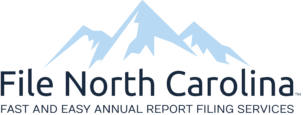The Tar Heel State is full of opportunities for those looking to start a business. In this post, we’ll guide you through some of the basics in a step-by-step process for starting a business in North Carolina.
Step 1: Pick a Name
Naming your organization is one of the hardest things you’ll do! Choose a name that conveys your company’s purpose or reflects the products or services sold. Choosing a good name is critical for branding and future customer acquisition.
The name of a North Carolina corporation should end with the words “corporation,” “incorporated,” or “company,” or the abbreviations “corp.,” “inc.,” or “co.”
A corporation’s name should be distinguishable from all alternative legal entity names on file with the Department of State.
Your company’s name should be recognizably different from the names of different business entities already on file with the North Carolina Secretary of State. The Secretary of State’s business name database checks names for convenience to see if they have been used already. Additionally, you cannot reserve a name before incorporating.
You cannot use a name currently registered in the state, so you also want to check the availability of your chosen name. Consider a few variations that can be registered instead if your chosen name is taken.
Step 2: Choose a Business Structure
Registering your business as a legal entity with the State of North Carolina helps to distinguish a separation between you as an individual and your company. This separation provides you with limited liability protection, an important protection that prevents you from being held personally responsible for lawsuits filed against your business. Creating a proper legal structure for your business exhibits credibility to prospective customers and potential investors.
When deciding on a business structure, there are several options.
- Limited Liability Company (LLC): Today, small business owners choose an LLC as the most common entity type. An LLC is often considered a “hybrid entity” as it provides the liability protections a standard corporation offers with the simplicity and flexibility of pass-through taxation. LLCs are attractive among small business owners because they require less record-keeping and fewer annual reporting and documentation requirements.
- Corporation: A C corporation is ideal for any business looking for a more formal corporate structure. Since corporations allow the issuance of stock, they are generally more attractive to entrepreneurs and investors who may want to invest in your business, making them extremely popular for companies seeking outside investment. Corporations also allow a business to deduct certain benefits, like employee health insurance and dental plans, which can add up to substantial yearly savings. C corporations are also required for all nonprofit organizations.
- Sole Proprietorship: A sole proprietorship is an informal business structure where an individual runs an unincorporated business without registration with the state. Operating your business as a sole proprietorship is the simplest way to run a business, as all taxation passes directly to the owner. However, operating as a Sole Proprietorship is not advisable in most cases, as it creates greater risk to the owner and operators. Operating as a sole proprietorship opens you up to potential legal and risk exposures since the owner is personally liable for any debts or lawsuits filed against the business. While it can be suitable in certain situations, running your business as a sole proprietorship in North Carolina is not recommended.
- Nonprofit: A nonprofit corporation (a type of C corporation) is a business formed to further a particular social cause or advocate for a specific point of view. Rather than earning a profit, a nonprofit corporation reinvests its revenue to achieve its mission and advance its programs instead of making a profit for owners and shareholders. Typically, nonprofits are funded by donations. One unique feature of a nonprofit is its eligibility for tax-exempt status.
- DBA (Doing Business As): A DBA is also called a “fictitious business name” or “assumed” name in some states. While a DBA is not a business entity, it can be legally filed against any business type to operate under a business name other than yours. If you plan to use an alternative name in your marketing or with your customers, you should consider a DBA in addition to registering your company name. For Example, File North Carolina is a DBA for BryteBridge File Co. Our legal name differs from how we do business or present ourselves to the public, so we registered File North Carolina as a DBA.
Step 3: Determine the Incorporator and Registered Agent
After selecting a name, you need to designate an incorporator and registered agent. What are these roles? Let’s explore!
- Incorporator: The Incorporator incorporates the business. They are responsible for filing the paperwork with the state, and their responsibilities end once the company is established.
- Registered Agent: A Registered Agent plays a vital role in handling legal documents received by your organization. The registered agent must be either a resident of North Carolina or a corporation authorized to conduct business there. By appointing a qualified registered agent, you ensure that critical legal communications and notices are promptly received and appropriately addressed on behalf of your organization.
Step 4: File Articles of Incorporation
This step is a big one! Incorporating legally establishes your company in North Carolina, making everything official. The Articles of Incorporation are legal documents that include essential information about the business, such as its name, address, officers, incorporator, registered agent, and more.
The corporation’s existence begins as soon as you file the articles of incorporation. We like to refer to the articles of Incorporation as the official “Birth Certificate” of your business.
Preparing Your Articles of Incorporation is a must if you’re forming a corporation in North Carolina. To incorporate a company in North Carolina, you must file a form known as Articles of Incorporation with the North Carolina Department of State. Simultaneously, pay a business filing fee.
Unless the articles specify a later date. Enclosed within the articles of incorporation are many topics that require immediate attention. At the very least, they need to contain the following:
- Name of the corporation
- Street address of the principal place of business
- Corporate purpose
- Details on the corporation’s stock structure
- Registered agent
- Names and addresses of incorporators.
North Carolina charges a filing fee and typically processes applications in 5 to 7 business days.
Step 5: Request a Federal EIN
Once you have obtained your Articles of Incorporation for your nonprofit organization, the next step is to apply for a Federal Employer Identification Number (EIN). This unique number serves as an identifier for your organization and is issued by the Internal Revenue Service (IRS). An EIN enables your company to conduct various business activities, such as opening bank accounts, filing state and federal taxes, and hiring employees.
Step 6: Stay Compliant
Compliance refers to everything necessary to keep your business legal active.
Here’s what’s required in North Carolina:
Annual Report Filing
Who Must File an Annual Report?
The following foreign and domestic companies must file an annual report to the North Carolina Secretary of State:
- C Corporation
- Limited Liability Company (LLC)
- Limited Liability Partnership (LLP)
- Limited Liability Limited Partnership (LLLP)
A domestic company is formed in the state, and a foreign company is formed in a different state but operates in North Carolina.
The following company types are not required to file an annual report to the North Carolina Secretary of State:
- Professional Corporations
- Professional LLCs
- Nonprofit Corporations
Charity Registrations (Nonprofits Only)
Nonprofits must file an initial charity registration once they have established the nonprofits and then must file an annual renewal. Charity Registration Renewals are due annually within 5.5 months after the close of your fiscal year. Remember, failing to renew can lead to the organization illegally soliciting funds.

